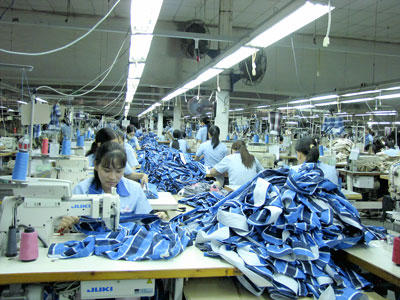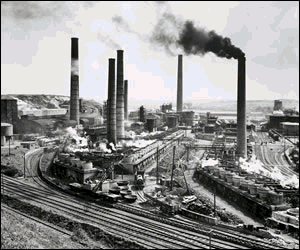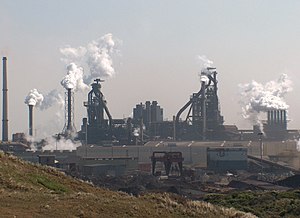How To Choose The Right Bearings: Industrial Bearings And More
 Producing food products is a demanding science. All of the industrial supplies and equipment that are used to manufacture foodstuff has to meet stringent requirements of quality and sanitation. When it comes to industrial bearings, the food industry has to look at unique options. For instance, would you want lubricating oil to contaminate food on the production line? Or what if bacteria were to grow in a machine’s housing? Consumers would be put off to say the least.
Producing food products is a demanding science. All of the industrial supplies and equipment that are used to manufacture foodstuff has to meet stringent requirements of quality and sanitation. When it comes to industrial bearings, the food industry has to look at unique options. For instance, would you want lubricating oil to contaminate food on the production line? Or what if bacteria were to grow in a machine’s housing? Consumers would be put off to say the least.
While industrial bearings have to be carefully chosen in terms of cleanliness and sanitation, they also have to be evaluated in terms of strength, hardness, durability, and cost. It takes a special set of materials that can meet all of those criteria.
Choosing Industrial Bearings And Inserts
The balls and rings themselves have to be made from high performance materials; regular iron will not meet the required FDA and USDA standards. A common choice within industry is to use stainless steel balls and rings. They combine high tensile strength with good corrosion resistance and will not contaminate food. However, they are one of the most expensive options, so other materials have been designed as balls as well.
Plastic blends and can be utilized by themselves or with stainless steel, especially in plain or non-rolled style industrial bearings. Coated iron is a less expensive option as well. A chrome coating will improve the balls’ hardness and corrosion resistance and increase their durability. Zinc coatings are also common for improving corrosion resistance and preventing contamination.
Housing Materials
Industrial supplies, like machine housings, also face strict standards since they will come into contact with food products during the production process. In general, housings have to be smooth surfaces to facilitate cleaning and help prevent the buildup of germs and bacteria that can occur in rough or porous materials. Polished housings are very common, and there are also anti-microbial coatings that can help protect industrial supplies and housings.
When considering materials of construction, housings are also typically stainless. The combination of strength, durability, and corrosion resistance is required. Industrial supplies in the food industrial equipment company will be subjected to acidic and caustic wash downs and cleanings, along with oils and other organic materials from the ingredients themselves.
Again, less expensive options are available. Plastic and polymer blends are also chemically inert and will resist cleaning solutions and food products. Plastics can be created with high tensile strengths and smooth surfaces. Coated iron is also applicable for housings. A nickel or Teflon coating will go a long way to preventing corrosion and contamination.
Industrial Bearings raw materials used in engineering industries And Lubrication
Using conventional oils and lubricants is clearly forbidden in the food processing industry. Lubricant contamination will spoil food, create a horrible taste, and is toxic if consumed. Always use FDA and USDA-approved greases for the food industry. These lubricants are called ‘H1’s’ and are free from odors and tastes and are nontoxic if any contamination occurs with the food being processed. H1 is …

 Screws come in many different forms. If you have not given it much thought before, these tiny tools are more powerful than you think. These are examples of construction
Screws come in many different forms. If you have not given it much thought before, these tiny tools are more powerful than you think. These are examples of construction  High speed dispersers are designed for intensive high speed, high shear mixing and dispersing of product, and are most often used in such industries as chemical, food and beverage, pharmaceutical, and cosmetic/personal care. They are ideal for viscous dispersions. Dispersers are available from bench top sizes to very large industrial production sizes that have the ability to disperse thousands of gallons at a time. These mixers are used in a wide range of applications because of their ability to apply intense shear and shorten mixing cycles that require hard to mix fluids to be formulated into emulsions, or agglomerated powders to be dispersed into a liquid medium. Powder dispersers are designed to integrate and disperse large amounts of difficult to wet powders into a pipeline flow with minimal air entrainment. Today, technological innovations have resulted in dispersers that generate a strong vacuum that ensures intense powder induction and wetting while delivering high discharge capacity.
High speed dispersers are designed for intensive high speed, high shear mixing and dispersing of product, and are most often used in such industries as chemical, food and beverage, pharmaceutical, and cosmetic/personal care. They are ideal for viscous dispersions. Dispersers are available from bench top sizes to very large industrial production sizes that have the ability to disperse thousands of gallons at a time. These mixers are used in a wide range of applications because of their ability to apply intense shear and shorten mixing cycles that require hard to mix fluids to be formulated into emulsions, or agglomerated powders to be dispersed into a liquid medium. Powder dispersers are designed to integrate and disperse large amounts of difficult to wet powders into a pipeline flow with minimal air entrainment. Today, technological innovations have resulted in dispersers that generate a strong vacuum that ensures intense powder induction and wetting while delivering high discharge capacity. You may be surprised to learn that the number of people willing to perform do-it-yourself electrical repairs at home grows greater every month. Many consumers, in an attempt to save money in difficult economic times, think they can do without hiring an electrician to perform simple tasks at home.
You may be surprised to learn that the number of people willing to perform do-it-yourself electrical repairs at home grows greater every month. Many consumers, in an attempt to save money in difficult economic times, think they can do without hiring an electrician to perform simple tasks at home. There are many dog foods out there on the market but which ones are right for your dog?
There are many dog foods out there on the market but which ones are right for your dog? Doing experiments is fun. It gives you time to discover scientific stuff, and it stimulates the mind and the learning process at the same time. In the laboratory, specifically a chemical laboratory, there are many tools and substances that can be useful in
Doing experiments is fun. It gives you time to discover scientific stuff, and it stimulates the mind and the learning process at the same time. In the laboratory, specifically a chemical laboratory, there are many tools and substances that can be useful in  If you or a loved one is facing a disabling situation for which you will need medical supplies beyond what your doctor or pharmacy can provide, you should know your avenues for obtaining these products conveniently. You first need to know what supplies you currently need or will need, and then you can begin investigating your options for purchasing the products.
If you or a loved one is facing a disabling situation for which you will need medical supplies beyond what your doctor or pharmacy can provide, you should know your avenues for obtaining these products conveniently. You first need to know what supplies you currently need or will need, and then you can begin investigating your options for purchasing the products. Identifying An Instrumentation Job
Identifying An Instrumentation Job Proper handling of gas cylinders is one aspect that usually gets overlooked in the welding industry. Most welding gases contain a combination of CO2, Argon, and Helium which are non flammable and non explosive but they can still be very harmful. If the cylinder gets knocked over causing the valve to be broken off, the exceedingly elevated pressure exiting from the cylinder can cause major harm to you, those around you, and any objects in the area.
Proper handling of gas cylinders is one aspect that usually gets overlooked in the welding industry. Most welding gases contain a combination of CO2, Argon, and Helium which are non flammable and non explosive but they can still be very harmful. If the cylinder gets knocked over causing the valve to be broken off, the exceedingly elevated pressure exiting from the cylinder can cause major harm to you, those around you, and any objects in the area. If you are planning a kids party probably birthday celebration then consider Kids Party Supplies that is offered by most of the retailers today. The party supply contains all the major and minor items that can enlighten your kid party and make it memorable for all the guests. In addition, you escape all the hassle that is associated with arranging party for your naughty child.
If you are planning a kids party probably birthday celebration then consider Kids Party Supplies that is offered by most of the retailers today. The party supply contains all the major and minor items that can enlighten your kid party and make it memorable for all the guests. In addition, you escape all the hassle that is associated with arranging party for your naughty child. If you find yourself investing in a business that requires heavy machinery or industrial equipment, one of your main concerns is finding the best quality equipment at the most reasonable cost. This is where the debate of purchasing either new or used machinery, or leasing equipment, come in. While each has its own advantages, going for second-hand takes the cake when saving money is involved.
If you find yourself investing in a business that requires heavy machinery or industrial equipment, one of your main concerns is finding the best quality equipment at the most reasonable cost. This is where the debate of purchasing either new or used machinery, or leasing equipment, come in. While each has its own advantages, going for second-hand takes the cake when saving money is involved. On a mission to find a replacement industrial alternator for your heavy-duty equipment?
On a mission to find a replacement industrial alternator for your heavy-duty equipment?